If a biopsy shows that colorectal cancer is present, your doctor needs to know the extent (stage) of the disease to plan the best treatment. The stage is based on whether the tumor has invaded nearby tissues, whether the cancer has spread, and, if so, to what parts of the body.
Tests Used for Staging Colorectal Cancers
If you had a screening or diagnostic test that suggested colon or rectal cancer, there’s a good chance your doctor performed a biopsy during your colonoscopy. Sometimes, the tissue removed during this colonoscopy is enough to determine the stage of the cancer. If not, however, it may be necessary to perform another colonoscopy to determine if more cancer is present.
In addition to a biopsy of areas that appear to be cancerous that are found during the colonoscopy, the following tests and procedures may be used in the staging process:
- Blood tests: Your doctor checks for carcinoembryonic antigen (CEA) and other substances in the blood. Some people who have colorectal cancer or other conditions have a high CEA level.
- Biomarker testing of the tumor: Also called molecular testing, this is when lab tests are run on a tumor sample to identify specific genes, proteins, and other factors unique to the tumor.
- Endorectal ultrasound: An ultrasound probe is inserted into your rectum. The probe sends out sound waves that people cannot hear. The waves bounce off your rectum and nearby tissues, and a computer uses the echoes to create a picture. The picture may show how deep a rectal tumor has grown or whether the cancer has spread to lymph nodes or other nearby tissues. Colorectal cancers should be tested for problems in mismatch repair proteins, called a mismatch repair defect (dMMR). Doing this looks for Lynch syndrome, and it also helps determine if immunotherapy is a treatment option.
- Chest X-ray: X-rays of your chest may show whether cancer has spread to your lungs.
- CT (computed tomography) scan: An x-ray machine linked to a computer takes a series of detailed pictures of areas inside your body. You may receive an injection of dye. A CT scan may show whether cancer has spread to the liver, lungs, or other organs.
- PET (positron emission tomography) scan: A small amount of radioactive glucose (sugar) is injected into a vein, which will be absorbed by cancer cells. Cancer cells are more active and take up more glucose than healthy cells. The scanner will detect the substance and produce detailed pictures of abnormal areas. You may hear this test referred to as a PET-CT scan, as it is often combined with a CT scan.
- MRI (magnetic resonance imaging): This procedure uses a magnet, radio waves, and a computer to make a series of detailed pictures of areas inside the colon. A substance called gadolinium is injected into a vein. The gadolinium collects around the cancer cells, so they show up brighter in the picture.
Stages of Colon and Rectal Cancers
There are several different systems used to stage cancer. The one most used for colorectal cancer, however, is the TNM system, created by the American Joint Committee on Cancer (AJCC).
TNM stands for:
- T: the size of the tumor and any spread of cancer into nearby tissue
- N: the spread of cancer to nearby lymph nodes
- M: metastasis (spread of cancer to other parts of the body)
The stages on your pathology report will be indicated by Roman numerals 0 through IV. As a general rule, the lower the number, the less the cancer has spread.
Here are the specific details on the TNM staging for colorectal cancer:
Tumor (T)
TX: The primary tumor cannot be evaluated.
T0 (T zero): There is no evidence of cancer in the colon or rectum.
Tis: Refers to carcinoma in situ (also called cancer in situ). Cancer cells are found only in the epithelium or lamina propria, which are the top layers lining the inside of the colon or rectum.
T1: The tumor has grown into the submucosa, which is the layer of tissue underneath the mucosa or lining of the colon.
T2: The tumor has grown into the muscularis propria, a deeper, thick layer of muscle that contracts to force along the contents of the intestines.
T3: The tumor has grown through the muscularis propria and into the subserosa, which is a thin layer of connective tissue beneath the outer layer of some parts of the large intestine, or it has grown into tissues surrounding the colon or rectum.
T4a: The tumor has grown into the surface of the visceral peritoneum, which means it has grown through all layers of the colon.
T4b: The tumor has grown into or has attached to other organs or structures.
Node (N)
NX: The regional lymph nodes cannot be evaluated.
N0 (N zero): There is no spread to regional lymph nodes.
N1a: There are tumor cells found in 1 regional lymph node.
N1b: There are tumor cells found in 2 or 3 regional lymph nodes.
N1c: There are nodules made up of tumor cells found in the structures near the colon that do not appear to be lymph nodes.
N2a: There are tumor cells found in 4 to 6 regional lymph nodes.
N2b: There are tumor cells found in 7 or more regional lymph nodes.
Metastasis (M)
M0 (M zero): The disease has not spread to a distant part of the body.
M1a: The cancer has spread to 1 other part of the body beyond the colon or rectum.
M1b: The cancer has spread to more than 1 part of the body other than the colon or rectum.
M1c: The cancer has spread to the peritoneal surface.
Grade
The grade (G) is an additional factor used to determine the state of colorectal cancer. The grade describes how much cancer cells look like healthy cells when viewed under a microscope. When cancer cells resemble normal cells, it is called “differentiated” or “low-grade tumor.” Cancer cells that look very different from normal cells are called “poorly differentiated” or “high-grade tumors.”
GX: The tumor grade cannot be identified.
G1: The cells are more like healthy cells, called well differentiated.
G2: The cells are somewhat like healthy cells, called moderately differentiated.
G3: The cells look less like healthy cells, called poorly differentiated.
G4: The cells barely look like healthy cells, called undifferentiated.
Stage Groups for Colorectal Cancer
Doctors describe colorectal cancer by the following stages:
Stage 0 Colorectal Cancer
Also called carcinoma in situ, cancer is found only in the innermost lining of the colon or rectum.
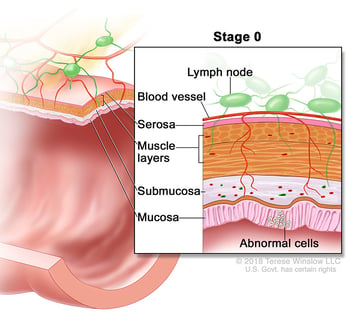
Stage I Colorectal Cancer
The tumor has grown into the inner wall of the colon or rectum. The tumor has not grown through the wall (T1 or T2, N0, M0).
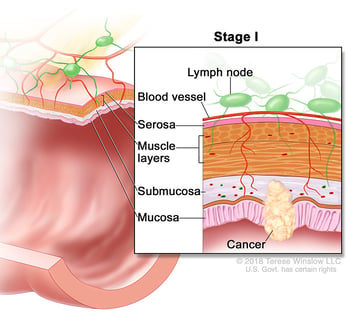
Stage II Colorectal Cancer
Stage IIA: The cancer has grown through the wall of the colon or rectum but has not spread to nearby tissue or to the nearby lymph nodes (T3, N0, M0).
Stage IIB: The cancer has grown through the layers of the muscle to the lining of the abdomen, called the visceral peritoneum. It has not spread to the nearby lymph nodes or elsewhere (T4a, N0, M0).
Stage IIC: The tumor has spread through the wall of the colon or rectum and has grown into nearby structures. It has not spread to the nearby lymph nodes or elsewhere (T4b, N0, M0).
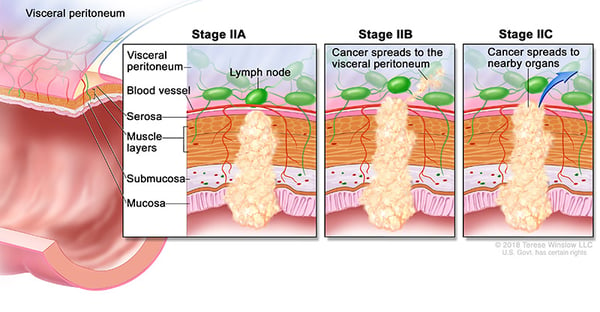
Stage III Colorectal Cancer
Stage IIIA: The cancer has grown through the inner lining or into the muscle layers of the intestine. It has spread to 1 to 3 lymph nodes or to a nodule of tumor cells in tissues around the colon or rectum that do not appear to be lymph nodes but has not spread to other parts of the body (T1 or T2, N1 or N1c, M0; or T1, N2a, M0).
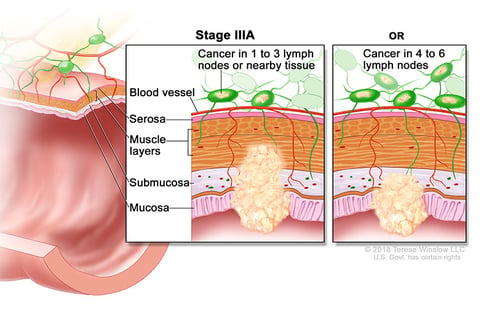
Stage IIIB: The cancer has grown through the bowel wall or to surrounding organs and into 1 to 3 lymph nodes or to a nodule of tumor in tissues around the colon or rectum that do not appear to be lymph nodes. It has not spread to other parts of the body (T3 or T4a, N1 or N1c, M0; T2 or T3, N2a, M0; or T1 or T2, N2b, M0).
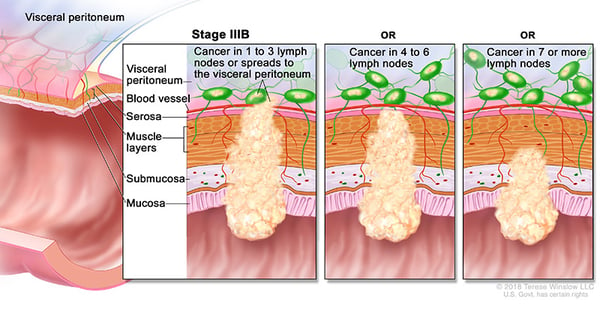
Stage IIIC: The cancer of the colon, regardless of how deep it has grown, has spread to 4 or more lymph nodes but not to other distant parts of the body (T4a, N2a, M0; T3 or T4a, N2b, M0; or T4b, N1 or N2, M0).
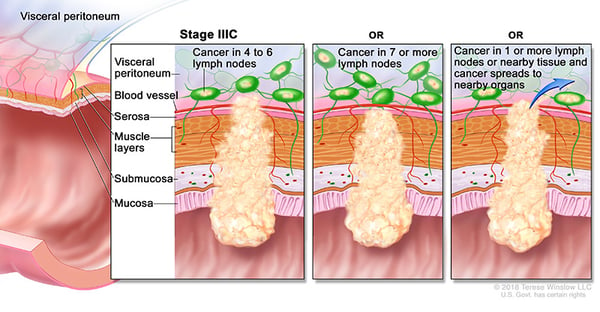
Stage IV Colorectal Cancer
Stage IVA: The cancer has spread to a single distant part of the body, such as the liver or lungs (any T, any N, M1a).
Stage IVB: The cancer has spread to more than 1 part of the body (any T, any N, M1b).
Stage IVC: The cancer has spread to the peritoneum. It may also have spread to other sites or organs (any T, any N, M1c).
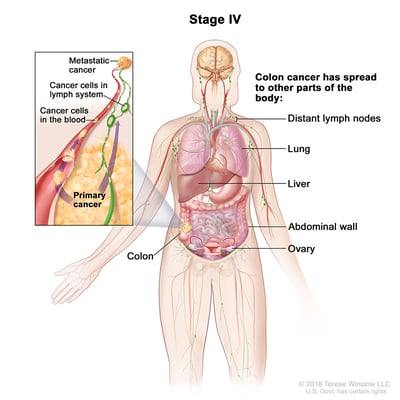
Recurrence
This is cancer that has been treated and has returned after a period of time when the cancer could not be detected. The disease may return in the colon or rectum or in another part of the body after colorectal cancer treatment.
Colorectal Cancer Care in the Portland-Vancouver Area
If you have been newly diagnosed with colorectal cancer, we encourage you to schedule an appointment with an oncologist. We offer personalized colorectal cancer treatment plans and second opinions for patients who live in the Portland, OR, or Vancouver, WA area. Find a colon and rectal cancer specialist near you.
